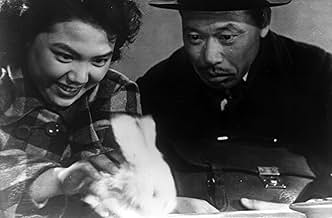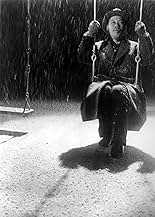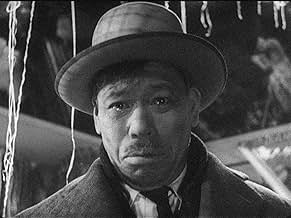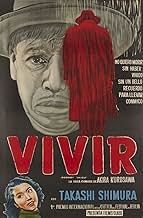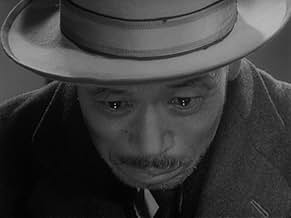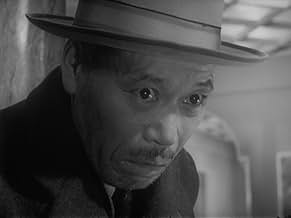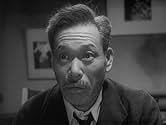A bureaucrat tries to find meaning in his life after he discovers he has terminal cancer.A bureaucrat tries to find meaning in his life after he discovers he has terminal cancer.A bureaucrat tries to find meaning in his life after he discovers he has terminal cancer.
- Director
- Writers
- Stars
- Nominated for 1 BAFTA Award
- 6 wins & 2 nominations total
- Director
- Writers
- All cast & crew
- Production, box office & more at IMDbPro
Featured reviews
10wobelix
Being one of the Founding Fathers of Cinema, Kurosawa shines to all directions. In his diverse oeuvre it is hard, if not impossible, to find a weak work.
Ikiru is the most humane film of this grand Humanist. Kurosawa's story telling skills are sublime, and he has surpassed himself with this movie.
The slow pace and ditto camera movements (except in the night with 'Mephistofeles' where all is logically much more frantic) enhances the story superbly. What a pity some of the nowadays public can't find the tranquility and maybe serenity to watch a gorgeous film like that. That part of the movie lovers will miss a brilliant film, that would have lingered in the mind forever...
Ikiru is the most humane film of this grand Humanist. Kurosawa's story telling skills are sublime, and he has surpassed himself with this movie.
The slow pace and ditto camera movements (except in the night with 'Mephistofeles' where all is logically much more frantic) enhances the story superbly. What a pity some of the nowadays public can't find the tranquility and maybe serenity to watch a gorgeous film like that. That part of the movie lovers will miss a brilliant film, that would have lingered in the mind forever...
Kanji Watanabi is a quiet, melancholy man who has spent all his life behind his office desk doing sweet eff-all. When he is diagnosed with stomach cancer he realizes that he has been petty much dead his whole life, and searches desperately for away to live again.
This is Akira Kurosawa's masterpiece, yes, even better than Rashomon and The Seven Samauri. It is a perfect true story of everybody's life- how we don't even realize we have it until we know it will be over in a short while. Watanabi's quest for self-discovery is one of the greatest from any motion picture ever made. The all-too-true paradox is one to end all paradoxes- that Watanabi is dead, and had been all his life, until he realized he was sick, which is when he began living for the first time. Takashi Shimura, the actor best known for his role as the wise, bald-headed Samauri in The Seven Samauri, and the professor out of the early Godzilla films, plays Watanabi perfectly- in my mind, it's one of the greatest film performances of all time.
Not everyone will love this movie. It was made a long time ago, the main character is an old fogey, it has subtitles, and it's pretty long. Many people today, especially young kids, would find it boring. Well, let 'em. There's no need to worry about them, they'll always have Pirates of the Carribbean, they'll always have The Matrix. Leave Ikiru and films like it to the true lovers of cinema.
This is Akira Kurosawa's masterpiece, yes, even better than Rashomon and The Seven Samauri. It is a perfect true story of everybody's life- how we don't even realize we have it until we know it will be over in a short while. Watanabi's quest for self-discovery is one of the greatest from any motion picture ever made. The all-too-true paradox is one to end all paradoxes- that Watanabi is dead, and had been all his life, until he realized he was sick, which is when he began living for the first time. Takashi Shimura, the actor best known for his role as the wise, bald-headed Samauri in The Seven Samauri, and the professor out of the early Godzilla films, plays Watanabi perfectly- in my mind, it's one of the greatest film performances of all time.
Not everyone will love this movie. It was made a long time ago, the main character is an old fogey, it has subtitles, and it's pretty long. Many people today, especially young kids, would find it boring. Well, let 'em. There's no need to worry about them, they'll always have Pirates of the Carribbean, they'll always have The Matrix. Leave Ikiru and films like it to the true lovers of cinema.
Probably one of the most difficult aspects a film like "Ikiru" has to overcome is the very rough march of time. To actually find someone these days, let's say a crowd of regular movie-goers to sit down and watch a film about an old Japanese man dying of cancer would be too much to ask.
Long held shots, hardly uplifting subject, to westerners very foreign. An array of reasons not to see it. And yet, once you actually start getting into the picture it doesn't let you go. Which is why it may be rightfully considered to be a classic.
Of all of Kurosawa's films this is probably the one movie that works perfectly on a universal level. Because at its core it is about one of the most basic desires of human existence...namely to be able to look back on your life and say "It was worth it."
In its starch and unforgiving black-and-white form the movie records the time of one man's life in such a beautiful and yes, colorful way, that by the time the final moments of the film play out, it will be very hard for anybody not to be touched. A glorious moment in 20th century cinema, that will hopefully be preserved for decades to come.
Long held shots, hardly uplifting subject, to westerners very foreign. An array of reasons not to see it. And yet, once you actually start getting into the picture it doesn't let you go. Which is why it may be rightfully considered to be a classic.
Of all of Kurosawa's films this is probably the one movie that works perfectly on a universal level. Because at its core it is about one of the most basic desires of human existence...namely to be able to look back on your life and say "It was worth it."
In its starch and unforgiving black-and-white form the movie records the time of one man's life in such a beautiful and yes, colorful way, that by the time the final moments of the film play out, it will be very hard for anybody not to be touched. A glorious moment in 20th century cinema, that will hopefully be preserved for decades to come.
10OttoVonB
Ikiru ("to live")is a Kurosawa film devoid of samurai or Toshiro Mifune. It is an oddity in his canon, neither an adaptation, nor an epic, or even a detective story. Instead, it is the simple and touching story of the last months of the life of a man, Watanabbe, public official, who decides to give a meaning to his life by transcending the obtuse and stiff mind of government bureaucracy to get a small public children's park built. As a parable for the soulless workings of modern bureaucracy, the goal is set pretty high, and Kurosawa goes even further, giving this story a lot of character, frequent humor, life and, most of all, heart. And going beyond the strengths of the direction and script, is the central performance by Takashi Shimura (later Kambei in Seven Samurai). Shimura gives his character such a transparently good heart and such great pain that every second of Watanabe's plight and struggle tugs at your heart, not in an overwhelmingly sentimental manner, but in one than feels honest and pure. If even many hardened souls will be drawn to tears, it is not for pity, but, admirably, because of envy for Watanabe's beautiful human dignity in the end, and for a film to have such power is beyond pure accomplishment, as the need to see this and, more importantly, feel it, goes beyond pure necessity...
This film touched me in a way no other film has. Filmed in black and white and gorgeous, both in the visuals and in how the story unfolds. Behold the clever manner of gradually unfolding the story as people jog each other's memories at his funeral (an obligation for them, that gradually turns into a real eulogy). Everything is told in flashbacks: the mourners' memories unfold naturally, as people remember what the man did and struggle to comprehend why.
This film I would nominate for the golden five of the century!
I first saw it in 1956 or so at a small theater in downtown Chicago. A second viewing, years later, confirmed my initial pleasure!
This film I would nominate for the golden five of the century!
I first saw it in 1956 or so at a small theater in downtown Chicago. A second viewing, years later, confirmed my initial pleasure!
Did you know
- TriviaWhen Takashi Shimura rehearsed his singing of "Song of the Gondola," director Akira Kurosawa instructed him to "sing the song as if you are a stranger in a world where nobody believes you exist."
- GoofsWhen Kanji and the Novelist go to a busy, loud nightclub, the film has been reversed as evidenced by the backwards "Nippon Beer" banner in the background.
- ConnectionsFeatured in The Siskel & Ebert 500th Anniversary Special (1989)
- SoundtracksJ'ai Deux Amours
(uncredited)
Music by Vincent Scotto
Lyrics by Georges Koger and Henri Varna
Performed by Josephine Baker
[Played when entering the bar with the long-faced man]
Details
Box office
- Gross US & Canada
- $60,239
- Opening weekend US & Canada
- $2,149
- Dec 29, 2002
- Gross worldwide
- $114,026
- Runtime
- 2h 23m(143 min)
- Color
- Sound mix
- Aspect ratio
- 1.37 : 1
Contribute to this page
Suggest an edit or add missing content

![Watch Trailer [OV]](https://m.media-amazon.com/images/M/MV5BMTg4OWJkNjMtM2Y0Mi00MzQ5LTk3Y2YtZWMwNGUyOTIyNGVjXkEyXkFqcGdeQXRyYW5zY29kZS13b3JrZmxvdw@@._V1_QL75_UX500_CR0)
